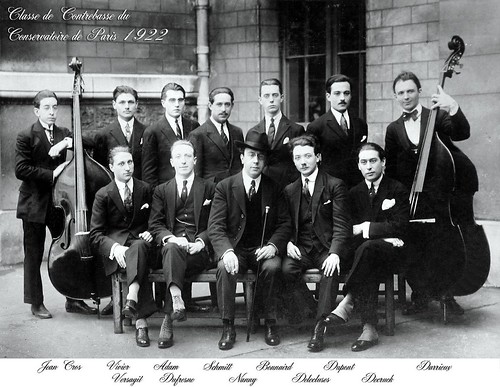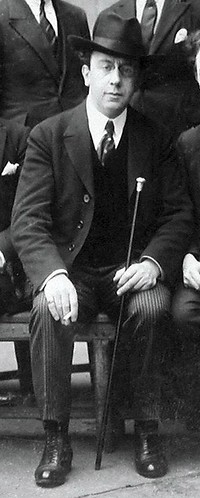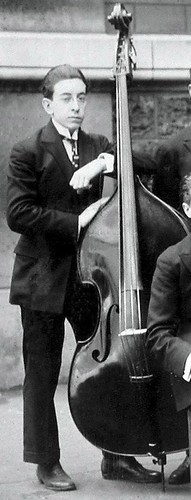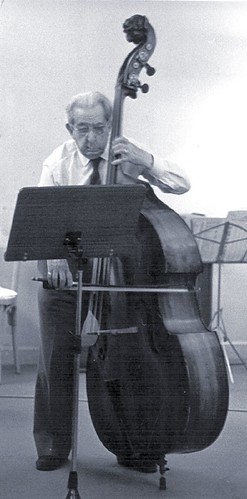This is a guest post by double bassist Jean-Yves Bénichou. Benjy is bi-national, being a citizen of both the United States and France. He has lived in France for the past 30 years and has been a member of the Strasbourg Philharmonic since 1985. He studied double bass at Temple University with Edward Arian and at Yale University with Homer Mensch, as well as additional studies with Roger Scott and François Rabbath.
Click here to read Benjy’s excellent post on how to polish ebony fingerboards.
I really appreciate the opportunity to post this excellent and informative article. Feel free to leave your thoughts and questions for Benjy in the comments to this post.
____________
Allow me to take you all back to the golden era of the Paris conservatory. Those were the days when Gabriel Fauré was director and head of the composition dept. and taught students such as Nadia Boulanger and Maurice Ravel.
The picture shows the “roaring” 1922 bass class headed by Edouard Nanny who is sitting in the middle holding a cigarette, and somewhat resembles Gustave Mahler. As you can see, the students liked their hair well slicked and were very concerned about the dress code.
Nanny developed a method book which was revolutionary at the time and which was internationally known and studied, even for François Rabbath. More on this here:
http://www.liben.com/frwashpostint.html
I should like to pay tribute to the student on the left, Mr. Jean Cros, who died 2 years ago at the age of 104 and 4 months. He was most probably Nanny’s oldest living student. He was an original member of the Toulouse Chamber Orchestra, composed of 11 strings and founded in 1953 by Louis Auriacombe. Jean Cros retired in 1976 and I took over his job after leaving the states. During my 6 year stay with them, Mr. Cros and I were very often together, talking about bass, and his past experiences with the group. He said that Nanny considered him his best student and friend. I don’t think that he would have ever wanted to lie to me in saying this.
Jean Cros was a very gentle and polite man who never raised his voice to anyone, and who spoke eloquent French. He was full of passion for his instrument and had recorded the Dittersdorf concerto at the age of 75, a year before he retired. I would often go to house to play duets with him. His age was no barrier to me and he was in fact younger at heart than my other bass colleagues who played in the local symphony orchestra.
One day he told me that he wished to perform a recital for his 80th birthday. And so he did. We worked together on a program that consisted of a piece for violin and bass by Mortari, a work for viola and bass by Sperger, the first movement of the 2nd “Grandi Duetti” by Bottesini, and the Alt bass quartet. I was always amazed in his presence to see that he was capable of keeping up such endurance and wondered if I would ever do the same and live so long. He continued to keep in touch with me, even though we were 1000 kms apart, up until the age of 102.
Jean Cros was also a horn player at the beginning and obtained a “Gold Medal” from the Conservatory at the age of 30. He unfortunately suffered a face paralysis on his left side and could no longer blow into the instrument due to the relaxation of the muscles. His eye was always watery as a result and he would very often wipe the tears away with a handkerchief. This of course, did not stop him from playing bass, although he always preferred to show his right profile in pictures.
For a man who was born in 1901, and had lived through a century that has given us the greatest inventions that have changed our lives such as the telephone, television, airplanes, automobiles, and more, his 80th birthday recital was but yet another milestone in his career. I’m sure that Nanny would have been extremely proud of his favourite pupil.
Related Posts:
Bass News Right To Your Inbox!
Subscribe to get our weekly newsletter covering the double bass world.






Awesome!Amazing! Thank you for the beautiful posting.
For those of you interested, I should like to add that there is a webpage (in French) dedicated to Nanny by his granddaughter:
http://perso.orange.fr/paris.plus/framnanny.htm
Any translation engine you have such as Bablefish:
http://world.altavista.com/
will help you understand the letters that Nanny wrote.
In one of them, he asks the director of the conservatory permission to add a 5th string the already existing 4 string instruments, in order to play lower notes, without any special practicing:
http://perso.orange.fr/paris.plus/framnanny.htm
You can also visit another webpage dedicated to Jean Cros, (uploaded by his granddaughter as well):
http://perso.orange.fr/paris.plus/nclasscros.htm
Granddaughters do come in handy once in a while.
This is a wonderful post, thank you, Benjy and Jason! Upon asking myself whether or not I would want to live to the age of 104, I’m not quite sure about the answer. But Jean Cros’ biography makes one think, that’s for sure. Being a witness of what was probably the most exciting century in contrabass history to date, and more that that: being a part of these amazing, creative developments… enviable! But it’s just as fantastic that the memory of such extraordinary life stories can be kept alive via the internet.
*Hehe* This is beautiful! Much as I respect the great Nanny, he, too, wasn’t infallible: l’accord de la contrebasse par quintes est injouable (roughly: “It’s impossible to play a double bass tuned in fifths”). That brings up one of those silly bassists’ questions: Does anybody know what strings they played back then? On the photo of the 1922 Conservatoire class, they don’t really look like gut strings, but I remember visiting the Thomastik factory in Vienna a couple of years ago, where they told me they were the first ones to come up with steel strings, and that must have been around 1920. Although modern fifth-tuned “Spiros” are quite an attractive affair, I guess that Nanny was probably referring to gut or silk strings, right?
Thanks for your enthusiastic commentary Rainer. When Nanny talks about tuning in fifths being a real problem for the bass, it was only in the context of developing the instrument further. This page on the Nanny website:
http://perso.orange.fr/paris.plus/framnanny.htm
shows him playing a 3,4, and 5 string bass. He used the 3 stringer for concertizing, preferred the 4 string bass above all, and developed the 5 string with a luthier in Mirecourt.
To answer your question as to whether he used gut or steel, it was most likely steel. In my high resolution pic here at home, the bass strings on the right side shine. Your research into the Thomastik company’s production may be correct.
You phoned my mother some days ago and I found your “blog” on Internet.
My mother and I would like to thank you for the homage to my Grandfather. He would probably have appreciate.
He came once at home and I showed him the Website concerning Edouard Nanny. My mother and I have sent all the documents concerning my Grandfather that you can see on this Website.
I remember when you sometimes came at home to play with my Grandfather… I was young and angry because I was mostly listening to “Rock” such as “The Who” or “The Police”, which made my Grandfather… “nervous” !!!
Please forgive my English as there is a lot of time I did not write in English !!!
I send you below the poem I wrote for my Grandfather when he died (French version of course !!)
Merci et bonne contiunation !!!
Marcelle, fille de Jean Cros et Anne-Marie, petite-fille.
Mon grand-père avait pour habitude de donner des prénoms de femmes à ses contrebasses….
Celle qui l’a accompagnée, jusqu’au bout, s’appelle Désirée.
DÉSIRÉE
Désirée ce soir, se tait,
Dans son coin, inerte, sans vie,
L’archet sur la commode est posé,
Mon Pépé est parti aujourd’hui.
Désirée ce soir est triste,
C’en est fini, de la magie de l’Artiste,
Qui caressait ses cordes en douceur,
En nous apportant la joie, ou les pleurs…
Désirée on le sait, a une âme,
Celle de Pépé est montée dans les Cieux,
Que va devenir cette Vieille Dame,
Sans l’amour de ce vieux Monsieur ?
Désirée ce soir est songeuse,
Elle garde espoir malgré tout,
Car ce que Pépé voulait surtout,
C’est qu’elle soit toujours heureuse…
Songez alors, Monsieur le Musicien,
Vous qui caresserez cette Dame,
Que sans Pépé, elle n’était rien…
Jouez pour lui, avec toute votre âme.
Et c’est alors, qu’entre vos mains,
Elle retrouvera le goût de vivre,
Pour que ses cordes, à nouveau, vibrent,
Et que Pépé l’entende…. au loin.
Mais Désirée ce soir, se tait,
Dans son coin, inerte, sans vie,
L’archet sur la commode est posé,
Mon Pépé est parti aujourd’hui.
(Anne-Marie – Septembre 2005)
cool site thanks teen sex
sJjnwV Hello!,
Hello!,
Hi!,
comment1,
Hi, good site,
Soft,